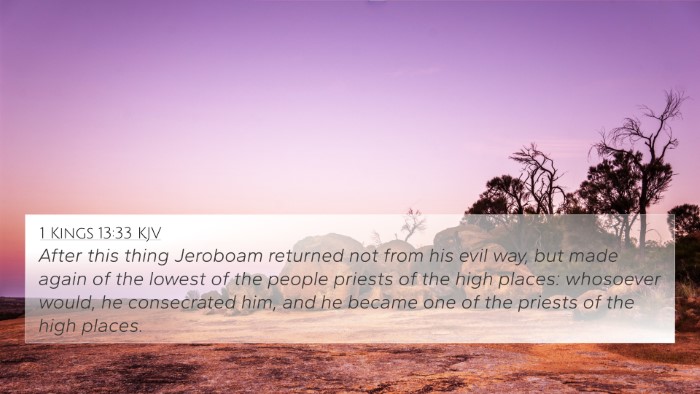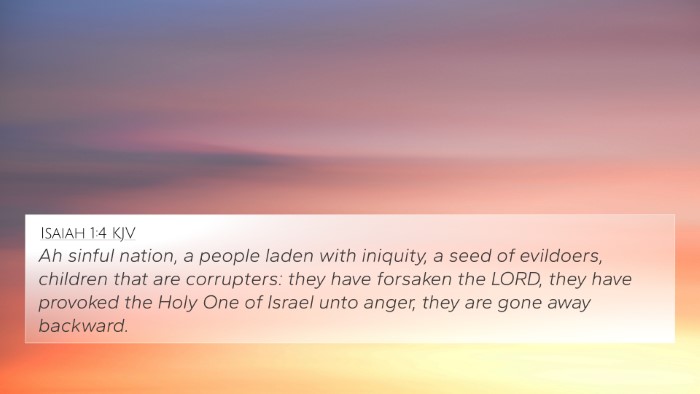Understanding 1 Kings 15:34
1 Kings 15:34 states, "And he did evil in the sight of the LORD, and walked in the way of Jeroboam, and in his sin wherewith he made Israel to sin." This verse provides insight into the character of King Baasha of Israel and establishes a thematic connection to sin and idolatry prevalent during his reign.
Verse Meaning and Interpretations
The verse makes it clear that Baasha, like his predecessors, continued in the sinful traditions initiated by Jeroboam, the first king of the northern kingdom of Israel. This obedience to Jeroboam’s ways highlights a significant moral failing in the leadership of Israel.
Commentary Insights
The commentaries by Matthew Henry, Albert Barnes, and Adam Clarke reveal several layers of meaning regarding this verse:
-
Matthew Henry:
Henry notes that Baasha's reign was marked by evil, indicating a deliberate choice to forsake the covenantal standards set by God. His actions reflect a broader societal trend towards idolatry, a theme consistently echoed throughout the narrative of the kings of Israel.
-
Albert Barnes:
Barnes emphasizes the continuation of Jeroboam's sins, suggesting that Baasha’s adoption of this sin underscores the significant spiritual decline within Israel. He identifies this passage as part of a warning against the consequences of leadership that leads the nation away from God.
-
Adam Clarke:
Clarke highlights the gravity of Baasha’s sins, paralleling them with the wickedness of Jeroboam. He notes that the generational impact of such sin is profound, as it leads an entire nation into rebellion against God, impacting not just the leadership but also the common populace.
Cross-References and Thematic Connections
This verse is intertwined with several others that discuss the themes of idolatry, sin, and leadership in Israel. Here are some key cross-references that illuminate these connections:
- 1 Kings 12:28-30 - Discusses Jeroboam's establishment of idol worship, which set the stage for the recurring sins of subsequent kings.
- 2 Kings 17:21-23 - Chronicles the continued sins and the resulting judgment upon Israel for their idolatry.
- 1 Kings 14:16 - Reflects on the consequences of abandoning the way of the Lord, tying back to the actions of Baasha.
- 1 Kings 16:2 - God’s admonition regarding Baasha’s lineage and his sins, foreshadowing the downfall of his dynasty.
- Jeremiah 7:16-20 - Warns against the consequences of societal rejection of God, echoing the themes present in Baasha's reign.
- Hosea 13:2 - Reflects on the sins of Israel, directly correlating with the behavior initiated by leaders like Baasha.
- 2 Chronicles 17:3 - Contrasts good leadership with the negative examples of kings like Baasha and Jeroboam.
Connecting Themes through Scriptural Cross-Referencing
These verses collectively illustrate the downfall of Israel due to poor leadership and idolatry. They resonate with various themes found throughout the Bible, making them relevant for studies on leadership impact, the seriousness of sin, and the importance of faithfulness to God. Here are some thematic connections:
- Leadership and Responsibility: The failure of leaders as a catalyst for national sin is a recurring theme. For instance, Proverbs 29:2 states, "When the righteous are in authority, the people rejoice; but when the wicked beareth rule, the people mourn."
- Idolatry's Consequences: The sin of idolatry is critiqued in various passages, including Exodus 20:3-5, establishing the unacceptability of worshiping other gods.
- The Importance of Covenant Faithfulness: A strong covenant theme extends into the prophetic books, affirming that faithfulness leads to blessings, while rebellion leads to judgment (see Deuteronomy 28).
Tools for Bible Cross-Referencing
Understanding the connections and deeper meanings requires effective tools, such as:
- Bible concordance
- Bible cross-reference guide
- Cross-reference Bible study methods
- Comprehensive Bible cross-reference materials
Conclusion
1 Kings 15:34 serves as a significant reminder of the impact of leadership on faithfulness to God. By exploring it through the lens of various biblical themes and cross-referencing related scriptures, one gains a deeper understanding of the tragic consequences of sin in the nation of Israel. For those studying scripture, this verse and its connections offer rich ground for reflection on the importance of divine guidance and faithfulness in life and leadership.







